Research in Business: Decentralization Impact on Tata Group Employees
VerifiedAdded on 2021/04/24
|6
|859
|33
Report
AI Summary
This research report investigates the impact of decentralization on employee performance within the Tata Group of Companies. The study explores how decentralization, where decision-making authority is delegated to lower or middle management levels, affects employee outcomes. The report examines the benefits, such as reduced managerial burden and improved focus, as well as the challenges, like potential coordination issues and the difficulty in maintaining uniform policies. The research utilizes a mixed methodology, combining secondary data from company websites and industry sources with interviews of managers and employees. The aims and objectives include identifying the advantages and disadvantages of decentralization and examining how employees are impacted by the management system. The study employs correlation analysis to determine the influence of decentralized management on employee performance, providing insights into the Tata Group's organizational structure and its effects on employee productivity and innovation.
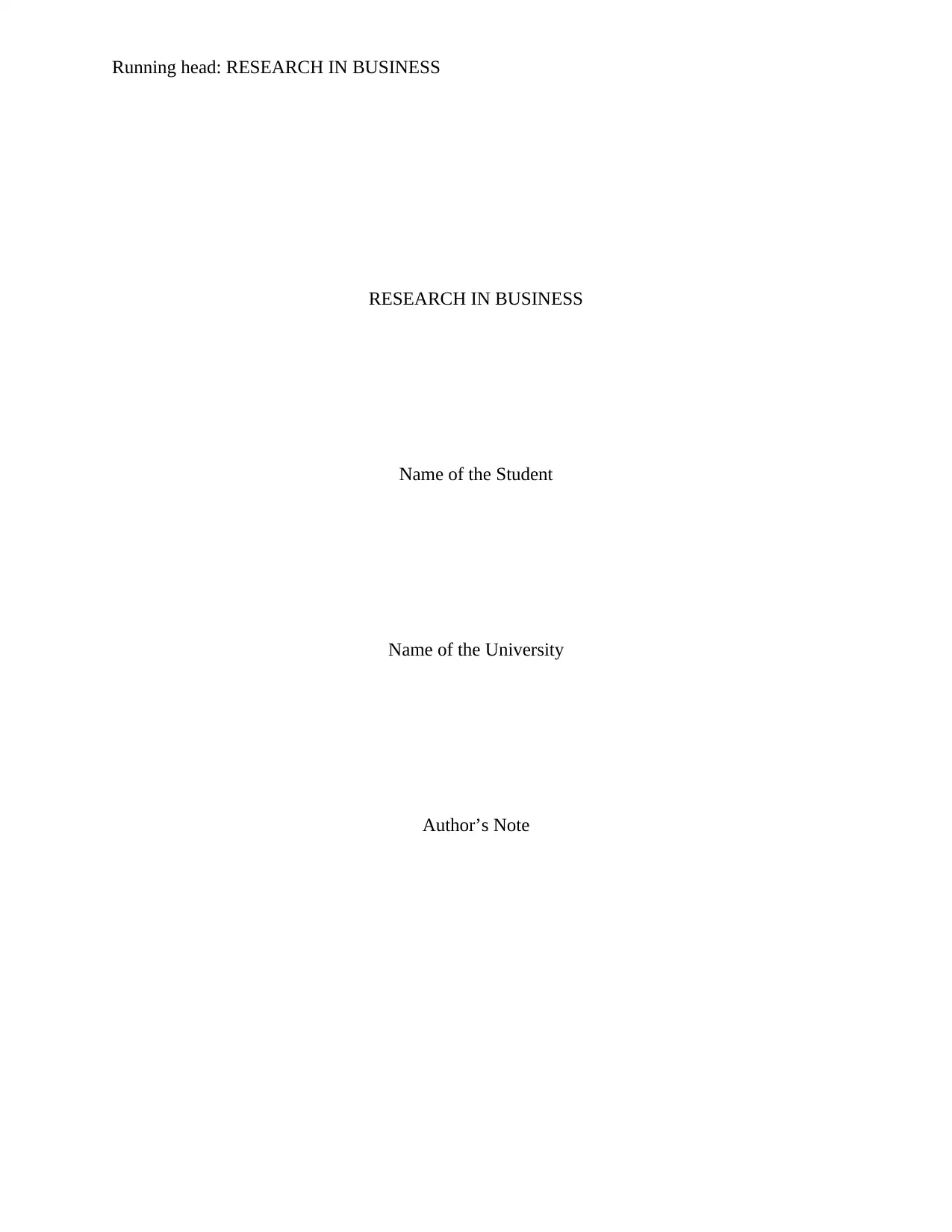
Running head: RESEARCH IN BUSINESS
RESEARCH IN BUSINESS
Name of the Student
Name of the University
Author’s Note
RESEARCH IN BUSINESS
Name of the Student
Name of the University
Author’s Note
Paraphrase This Document
Need a fresh take? Get an instant paraphrase of this document with our AI Paraphraser
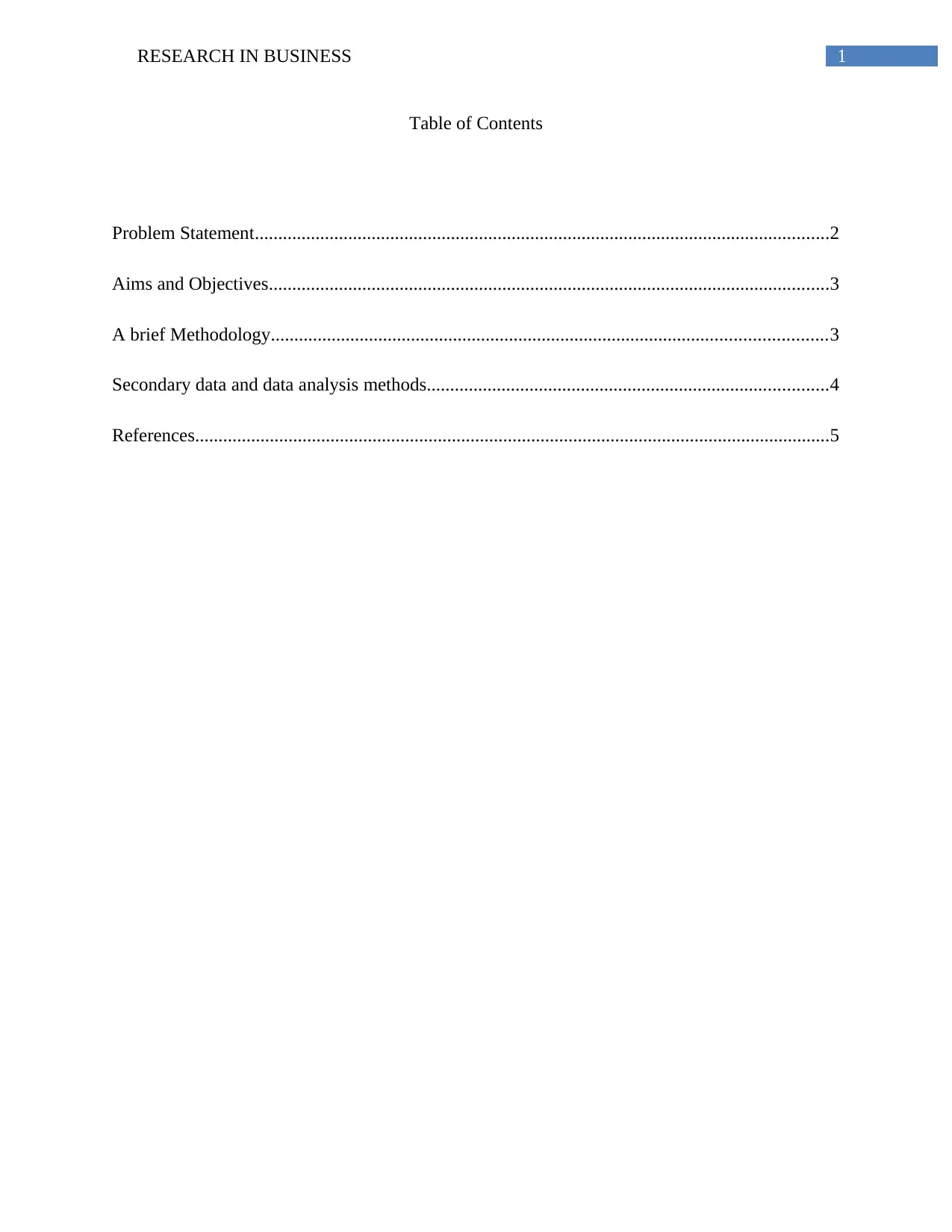
1RESEARCH IN BUSINESS
Table of Contents
Problem Statement...........................................................................................................................2
Aims and Objectives........................................................................................................................3
A brief Methodology.......................................................................................................................3
Secondary data and data analysis methods......................................................................................4
References........................................................................................................................................5
Table of Contents
Problem Statement...........................................................................................................................2
Aims and Objectives........................................................................................................................3
A brief Methodology.......................................................................................................................3
Secondary data and data analysis methods......................................................................................4
References........................................................................................................................................5
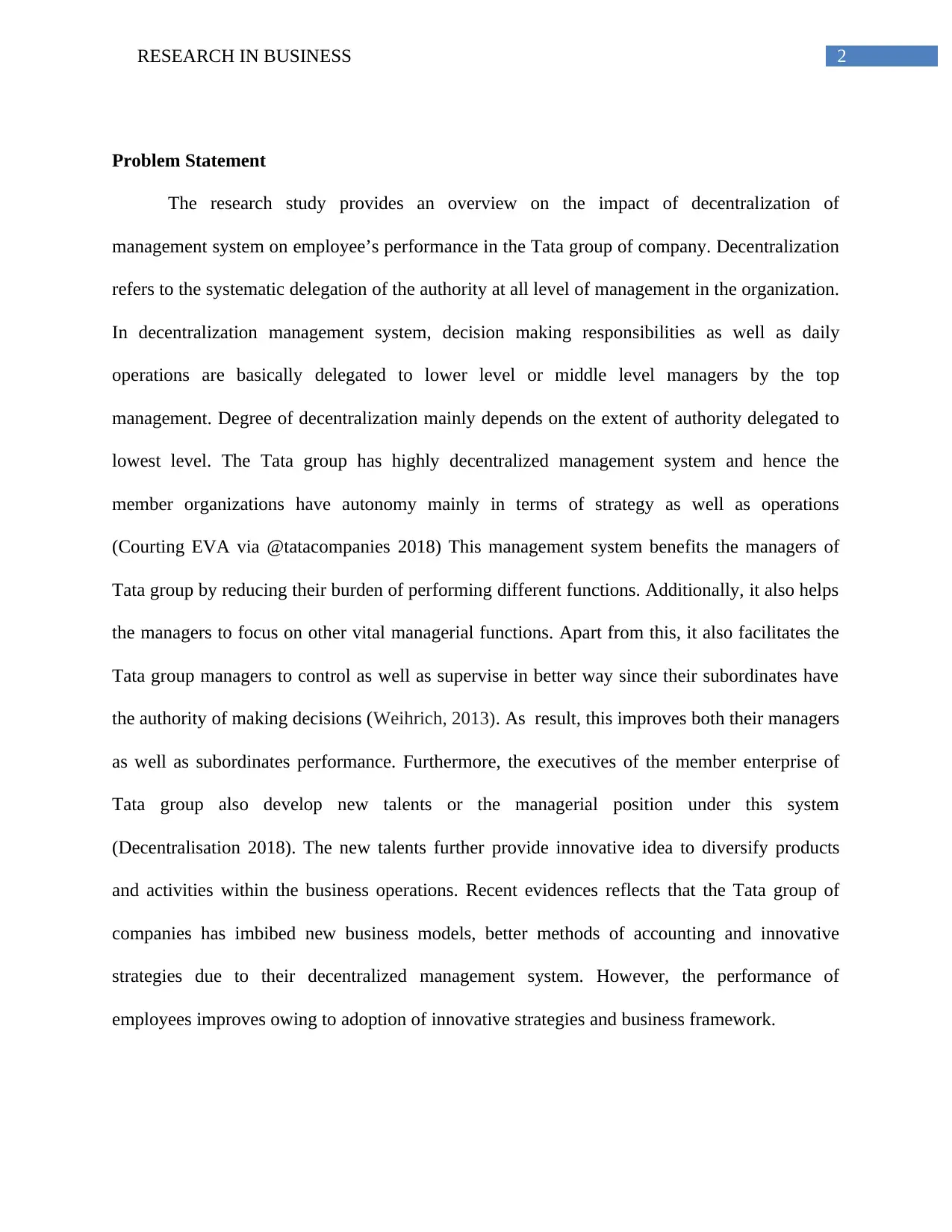
2RESEARCH IN BUSINESS
Problem Statement
The research study provides an overview on the impact of decentralization of
management system on employee’s performance in the Tata group of company. Decentralization
refers to the systematic delegation of the authority at all level of management in the organization.
In decentralization management system, decision making responsibilities as well as daily
operations are basically delegated to lower level or middle level managers by the top
management. Degree of decentralization mainly depends on the extent of authority delegated to
lowest level. The Tata group has highly decentralized management system and hence the
member organizations have autonomy mainly in terms of strategy as well as operations
(Courting EVA via @tatacompanies 2018) This management system benefits the managers of
Tata group by reducing their burden of performing different functions. Additionally, it also helps
the managers to focus on other vital managerial functions. Apart from this, it also facilitates the
Tata group managers to control as well as supervise in better way since their subordinates have
the authority of making decisions (Weihrich, 2013). As result, this improves both their managers
as well as subordinates performance. Furthermore, the executives of the member enterprise of
Tata group also develop new talents or the managerial position under this system
(Decentralisation 2018). The new talents further provide innovative idea to diversify products
and activities within the business operations. Recent evidences reflects that the Tata group of
companies has imbibed new business models, better methods of accounting and innovative
strategies due to their decentralized management system. However, the performance of
employees improves owing to adoption of innovative strategies and business framework.
Problem Statement
The research study provides an overview on the impact of decentralization of
management system on employee’s performance in the Tata group of company. Decentralization
refers to the systematic delegation of the authority at all level of management in the organization.
In decentralization management system, decision making responsibilities as well as daily
operations are basically delegated to lower level or middle level managers by the top
management. Degree of decentralization mainly depends on the extent of authority delegated to
lowest level. The Tata group has highly decentralized management system and hence the
member organizations have autonomy mainly in terms of strategy as well as operations
(Courting EVA via @tatacompanies 2018) This management system benefits the managers of
Tata group by reducing their burden of performing different functions. Additionally, it also helps
the managers to focus on other vital managerial functions. Apart from this, it also facilitates the
Tata group managers to control as well as supervise in better way since their subordinates have
the authority of making decisions (Weihrich, 2013). As result, this improves both their managers
as well as subordinates performance. Furthermore, the executives of the member enterprise of
Tata group also develop new talents or the managerial position under this system
(Decentralisation 2018). The new talents further provide innovative idea to diversify products
and activities within the business operations. Recent evidences reflects that the Tata group of
companies has imbibed new business models, better methods of accounting and innovative
strategies due to their decentralized management system. However, the performance of
employees improves owing to adoption of innovative strategies and business framework.
⊘ This is a preview!⊘
Do you want full access?
Subscribe today to unlock all pages.

Trusted by 1+ million students worldwide
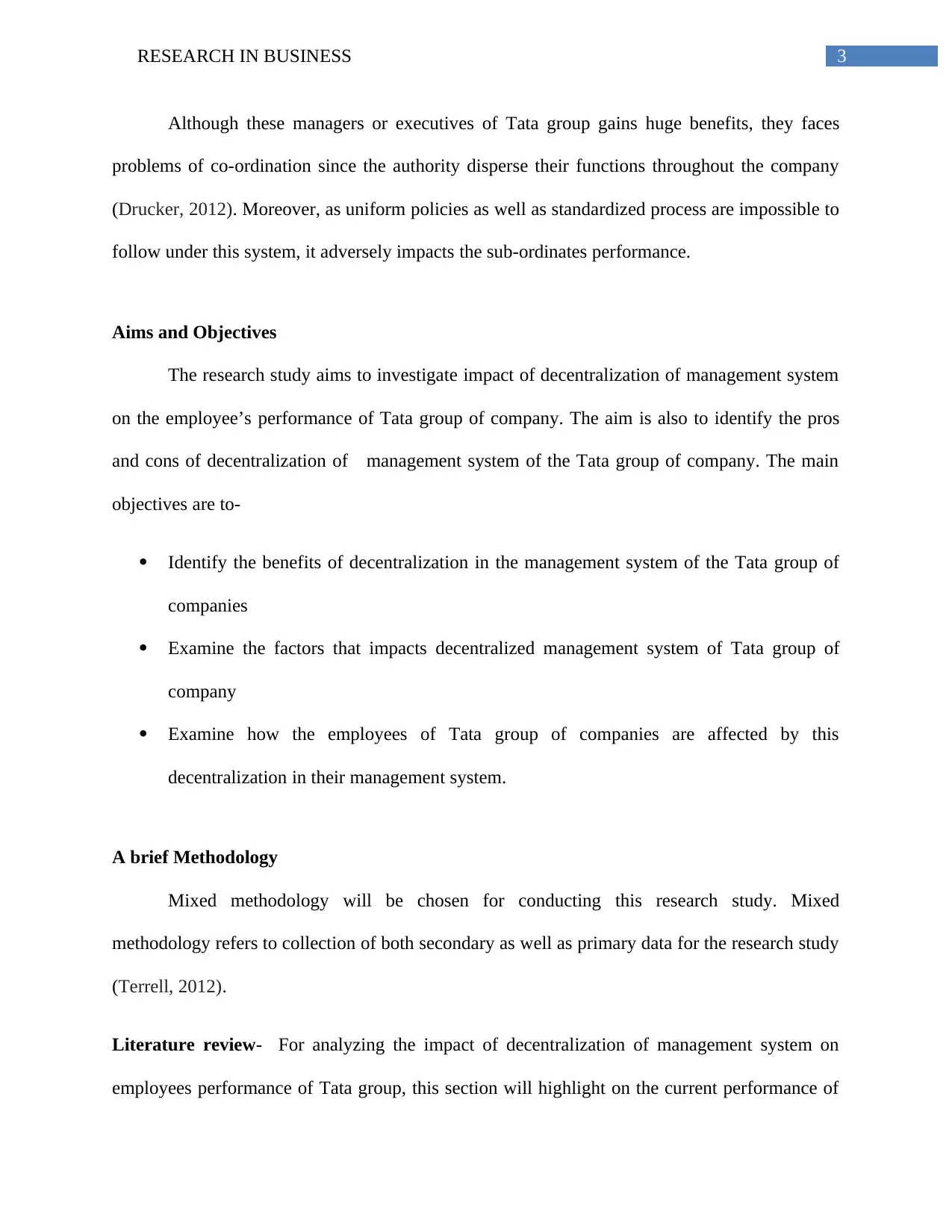
3RESEARCH IN BUSINESS
Although these managers or executives of Tata group gains huge benefits, they faces
problems of co-ordination since the authority disperse their functions throughout the company
(Drucker, 2012). Moreover, as uniform policies as well as standardized process are impossible to
follow under this system, it adversely impacts the sub-ordinates performance.
Aims and Objectives
The research study aims to investigate impact of decentralization of management system
on the employee’s performance of Tata group of company. The aim is also to identify the pros
and cons of decentralization of management system of the Tata group of company. The main
objectives are to-
Identify the benefits of decentralization in the management system of the Tata group of
companies
Examine the factors that impacts decentralized management system of Tata group of
company
Examine how the employees of Tata group of companies are affected by this
decentralization in their management system.
A brief Methodology
Mixed methodology will be chosen for conducting this research study. Mixed
methodology refers to collection of both secondary as well as primary data for the research study
(Terrell, 2012).
Literature review- For analyzing the impact of decentralization of management system on
employees performance of Tata group, this section will highlight on the current performance of
Although these managers or executives of Tata group gains huge benefits, they faces
problems of co-ordination since the authority disperse their functions throughout the company
(Drucker, 2012). Moreover, as uniform policies as well as standardized process are impossible to
follow under this system, it adversely impacts the sub-ordinates performance.
Aims and Objectives
The research study aims to investigate impact of decentralization of management system
on the employee’s performance of Tata group of company. The aim is also to identify the pros
and cons of decentralization of management system of the Tata group of company. The main
objectives are to-
Identify the benefits of decentralization in the management system of the Tata group of
companies
Examine the factors that impacts decentralized management system of Tata group of
company
Examine how the employees of Tata group of companies are affected by this
decentralization in their management system.
A brief Methodology
Mixed methodology will be chosen for conducting this research study. Mixed
methodology refers to collection of both secondary as well as primary data for the research study
(Terrell, 2012).
Literature review- For analyzing the impact of decentralization of management system on
employees performance of Tata group, this section will highlight on the current performance of
Paraphrase This Document
Need a fresh take? Get an instant paraphrase of this document with our AI Paraphraser
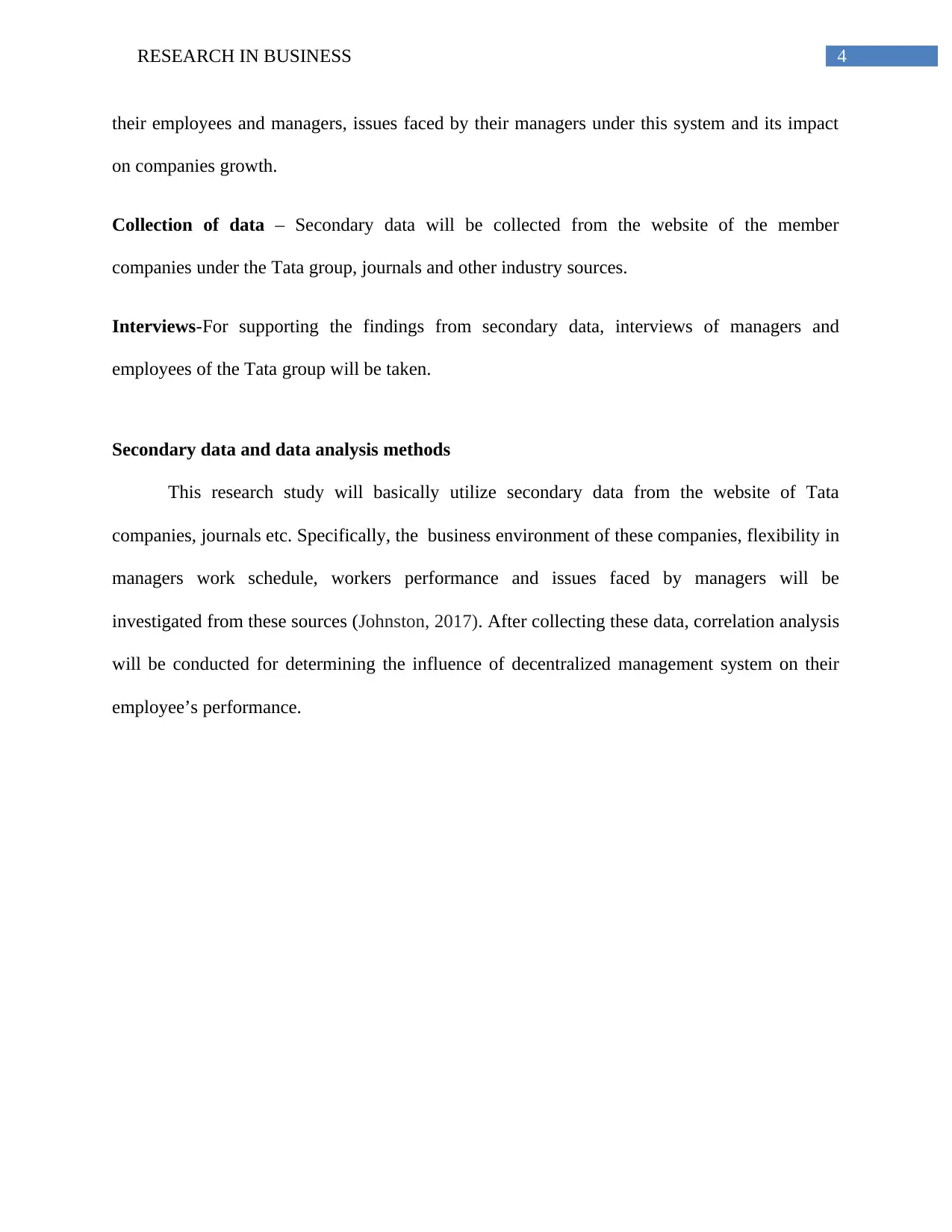
4RESEARCH IN BUSINESS
their employees and managers, issues faced by their managers under this system and its impact
on companies growth.
Collection of data – Secondary data will be collected from the website of the member
companies under the Tata group, journals and other industry sources.
Interviews-For supporting the findings from secondary data, interviews of managers and
employees of the Tata group will be taken.
Secondary data and data analysis methods
This research study will basically utilize secondary data from the website of Tata
companies, journals etc. Specifically, the business environment of these companies, flexibility in
managers work schedule, workers performance and issues faced by managers will be
investigated from these sources (Johnston, 2017). After collecting these data, correlation analysis
will be conducted for determining the influence of decentralized management system on their
employee’s performance.
their employees and managers, issues faced by their managers under this system and its impact
on companies growth.
Collection of data – Secondary data will be collected from the website of the member
companies under the Tata group, journals and other industry sources.
Interviews-For supporting the findings from secondary data, interviews of managers and
employees of the Tata group will be taken.
Secondary data and data analysis methods
This research study will basically utilize secondary data from the website of Tata
companies, journals etc. Specifically, the business environment of these companies, flexibility in
managers work schedule, workers performance and issues faced by managers will be
investigated from these sources (Johnston, 2017). After collecting these data, correlation analysis
will be conducted for determining the influence of decentralized management system on their
employee’s performance.
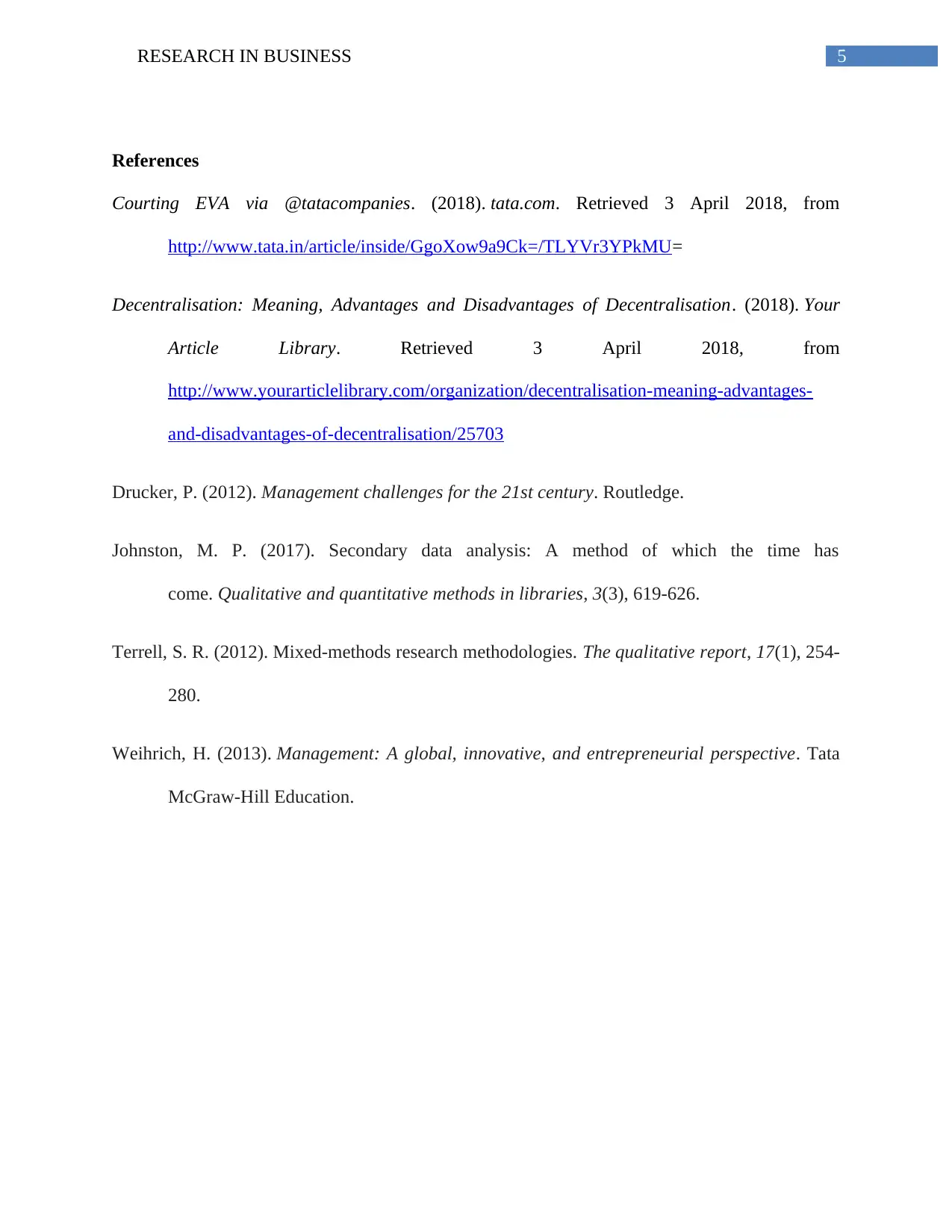
5RESEARCH IN BUSINESS
References
Courting EVA via @tatacompanies. (2018). tata.com. Retrieved 3 April 2018, from
http://www.tata.in/article/inside/GgoXow9a9Ck=/TLYVr3YPkMU=
Decentralisation: Meaning, Advantages and Disadvantages of Decentralisation. (2018). Your
Article Library. Retrieved 3 April 2018, from
http://www.yourarticlelibrary.com/organization/decentralisation-meaning-advantages-
and-disadvantages-of-decentralisation/25703
Drucker, P. (2012). Management challenges for the 21st century. Routledge.
Johnston, M. P. (2017). Secondary data analysis: A method of which the time has
come. Qualitative and quantitative methods in libraries, 3(3), 619-626.
Terrell, S. R. (2012). Mixed-methods research methodologies. The qualitative report, 17(1), 254-
280.
Weihrich, H. (2013). Management: A global, innovative, and entrepreneurial perspective. Tata
McGraw-Hill Education.
References
Courting EVA via @tatacompanies. (2018). tata.com. Retrieved 3 April 2018, from
http://www.tata.in/article/inside/GgoXow9a9Ck=/TLYVr3YPkMU=
Decentralisation: Meaning, Advantages and Disadvantages of Decentralisation. (2018). Your
Article Library. Retrieved 3 April 2018, from
http://www.yourarticlelibrary.com/organization/decentralisation-meaning-advantages-
and-disadvantages-of-decentralisation/25703
Drucker, P. (2012). Management challenges for the 21st century. Routledge.
Johnston, M. P. (2017). Secondary data analysis: A method of which the time has
come. Qualitative and quantitative methods in libraries, 3(3), 619-626.
Terrell, S. R. (2012). Mixed-methods research methodologies. The qualitative report, 17(1), 254-
280.
Weihrich, H. (2013). Management: A global, innovative, and entrepreneurial perspective. Tata
McGraw-Hill Education.
⊘ This is a preview!⊘
Do you want full access?
Subscribe today to unlock all pages.

Trusted by 1+ million students worldwide
1 out of 6
Related Documents
Your All-in-One AI-Powered Toolkit for Academic Success.
+13062052269
info@desklib.com
Available 24*7 on WhatsApp / Email
![[object Object]](/_next/static/media/star-bottom.7253800d.svg)
Unlock your academic potential
Copyright © 2020–2025 A2Z Services. All Rights Reserved. Developed and managed by ZUCOL.




